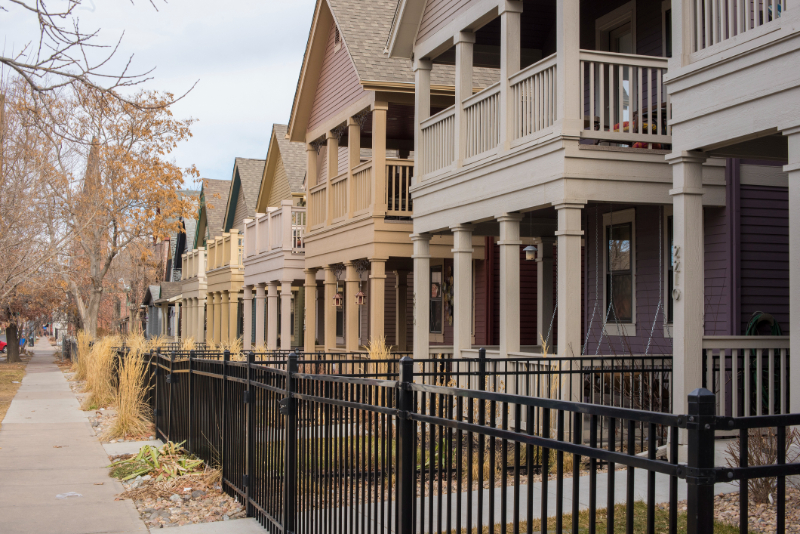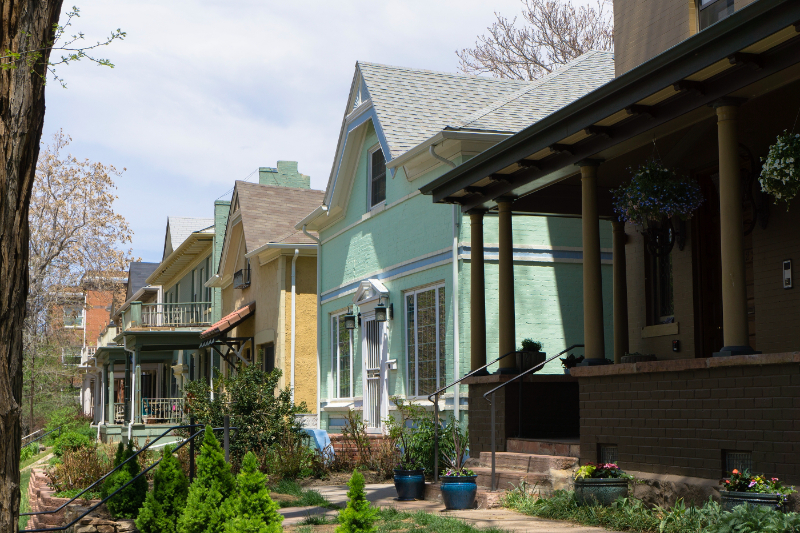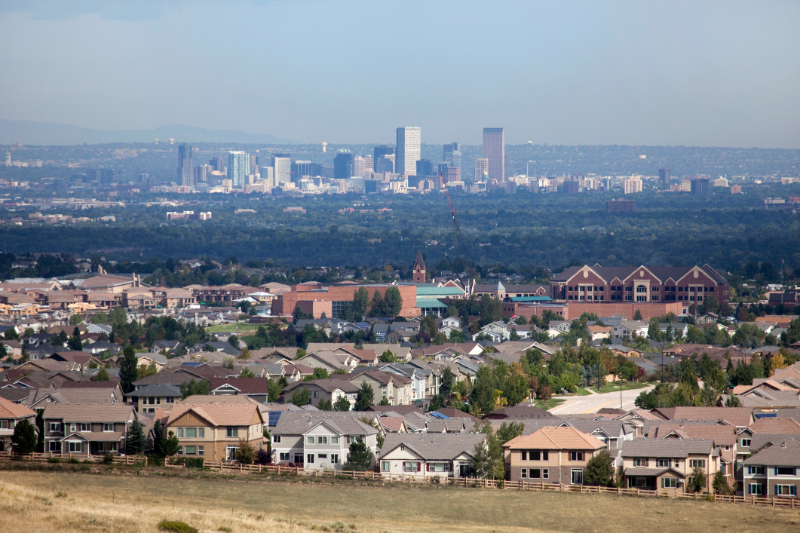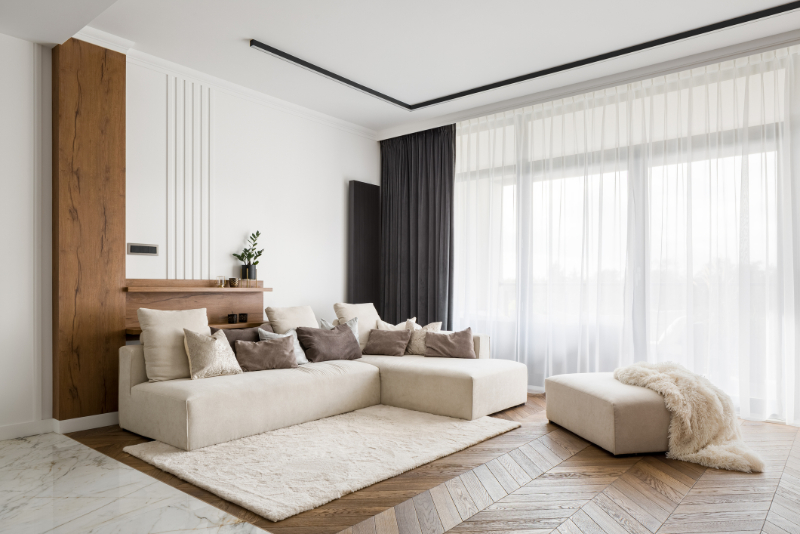The sheer number of housing options in Mile High City can be astounding. If you’re sorting through listings by property age, here’s a general comparison between modern and historic homes in Denver, Colorado.

Table of Contents:
According to the National Association of Home Builders (NAHB), the median age of homes in the United States is 39 years old while the median age of residential properties in the State of Colorado is 36 years. The aging housing stock across much of the U.S. offers many opportunities to own a beautiful historic home with provenance, notable architecture, and exceptional design. Historic homes in Denver, in particular, are highly coveted for their unique character and historical significance.
The city offers a diverse range of architectural styles that evolved through more than a century of its existence. Many historic homes in Denver have design influences from World War I and II as well as the Arts and Crafts movement.
Best known for Mountain Contemporary-style homes, which make use of locally-sourced materials and an earthy combination of natural wood, stone, and iron, as well as Traditional Denver homes that can be found in many residential pockets, the city has a rich architectural history that reflects the resourcefulness and design sensibility of its inhabitants.
Prevalent architectural styles in and around the city also include:
- Bungalow
- Cabin
- Contemporary
- Denver Square
- Minimal Traditional
- Rustic Contemporary
- Swiss Chalet
- Traditional
- Tudor
- Victorian
In most places in the U.S., a home is considered historic if it is at least 50 years old and has retained much of its original architecture, materials, and design elements. Aside from individual homes, certain neighborhoods and districts in Denver have been given a historic designation with strict requirements for the restoration and preservation of the homes located in those areas.
Notable historic neighborhoods and districts in Denver include:
- Baker is a trendy neighborhood with a fine selection of stately Victorians and cozy Bungalows. It is home to Landmarks’ Mayan Theatre, an Art Deco building that dates back to 1930 and which screens independent films.
- Capitol Hill is an established neighborhood known for stately Victorians and Queen Anne cottages. It is home to the Molly Brown House Museum, which features gorgeous stained glass and period furnishings, and the Colorado State Capitol, a Neoclassical structure designed after the Capitol Building in Washington, D.C.
- Curtis Park Historic District features an eclectic mix of architectural styles with Classical Denver Foursquare, Eastlake, Italianate, Gothic Revival, Queen Anne, Romanesque, and Craftsman-style homes, many of which date back to the 19th century and early 20th century. The neighborhood is known for the Black American West Museum & Heritage Center, which is housed in a Victorian built in the 1890.
- Highland is prized for its stunning Victorian, Bungalow, and Craftsman-style homes as well as its trendy restaurants and cocktail bars. The neighborhood overlooks downtown Denver and provides access to Elitch Gardens Theme & Water Park.
- Lower Downtown Historic District (LoDo) is a vibrant commercial and residential area dating back to 1858. It harbors an exquisite collection of late 19th and early 20th-century commercial buildings, including Art Deco, Chicago, Neoclassical, Renaissance Revival, and Warehouse-style structures along with several historic hotels.
- Montclair is known for Ranch, Mid-Century Modern, Tudor Revival, and Colonial Revival-style homes on large lots with mature landscaping. This desirable neighborhood is home to the Montclair Civic Building, also known as The Molkery, a Germanic Castle type of structure that dates back to 1888.
- Potter Highlands Historic District is a National Historic District that gets its name from Rev. Walter McDuffie Potter, who co-founded the First Baptist Church of Denver. The neighborhood was the site of the Oakes Home for Consumptives, a 1905 Colonial Revival-style building that served as a tuberculosis sanatorium. All that remains of the original structure is the Elizabeth’s Retreat Chapel.
The difference between historic homes and older homes
When looking for historic homes in Denver, it’s important to distinguish between older homes and properties with a historic designation from local or national preservation organizations. An older home can refer to any property that is 20 to 30 years old while a historic home has significant historical, architectural, or cultural value that can be traced and verified through public records.

The design of historic homes typically reflect a specific architectural movement or time period. These homes often have unique and artisanal details, such as decorative trim, ornate moldings, hand-cut stonework, or wrought iron that reflect the prevalent aesthetic and craftsmanship of the era in which they were built.
While older homes may not have the same cultural or historical significance as historic homes, they may still possess a combination of unique and appealing architectural features. Lastly, historic homes are often seen as cultural treasures that must be preserved, while older homes can be either torn down or renovated extensively without the approval of a historic preservation board.
How a home receives historic designation
To be considered historic, a home must be certified by either a local, state, or national preservation agency. The certification process typically involves a thorough review and evaluation of the property’s history, construction, ownership, architecture, and overall condition. The Colorado State Historic Preservation Office (SHPO) identifies, evaluates, and adds local historic properties to the National Register of Historic Places.
The Colorado State Historical Fund offers grants and various forms of assistance to homeowners and organizations dedicated to preserving historic structures. It also manages the Colorado State Register of Historic Properties, which contains a list of sites or properties that have been recognized for their cultural value and are meant to be preserved.
In addition, many cities and towns in Colorado have their own historic preservation programs and ordinances that provide additional protections for historic properties. These programs may also offer tax incentives, grants, or other financial assistance to property owners who maintain and preserve their historic homes.
Inclusion on state or national registers does not necessarily prevent the sale or transfer of ownership of a historic home. However, its historic designation can affect the way in which the property can be used or renovated. A historic home may be subject to certain restrictions and requirements in order to protect its historic character.
Before purchasing historic homes in Denver, it’s important for buyers to understand any restrictions that may apply. In some cases, significant alterations to the property may require approval from local or state preservation agencies.
Insurance coverage for historic homes
Purchasing specialized insurance coverage for a historic home is often recommended. A regular homeowner’s insurance policy may not offer sufficient coverage for a historic home that has been restored or renovated using historically accurate methods and materials. Some insurance companies provide special coverage for historic homes, including coverage for the cost of repairing and replacing unique features.
The difference between modern homes, newer homes, and new construction
A modern home refers to a home with Modern or Contemporary-style architecture, which features open floor plans, natural materials, and clean and elegant lines. These homes tend to have large or oversized windows that allow for plenty of natural light and command stunning views. They may have flat or low-pitched roofs as well as integrated outdoor living spaces. Lastly, modern homes may have smart features and energy-efficient components. Modern homes can be found throughout Denver.
While modern homes are associated with a specific architectural style, newer homes and new construction are distinguished by the age of the property.
- A newer home is typically less than 10 to 20 years old with one or a handful of previous owners. These homes may also have modern features and updated appliances. However, these homes may show some signs of wear and tear.
- New construction refers to homes that have just been recently built and have never been occupied. These homes are typically custom-built by developers or builders and can range from entry-level to luxury. New construction homes often come with warranties from the builder.
Some of the main differences between newer homes and new construction include:
- Customization – New construction allows for a higher level of customization while newer homes may be retrofitted with limited customization options.
- Maintenance – Newer homes will require more upkeep depending on how well it was initiated by previous occupants while new construction will require little to no maintenance in the first few years of habitation.
- Technology – New construction often comes with the latest smart home technology and green features while newer homes may require upgrades depending on the age of the property.
When buyers talk about modern homes, they are usually talking about newer homes or new construction though it is certainly possible for a newer and new construction home to have Modern or Contemporary design. Making the distinction between these three categories will help guide your property search.
THE DIFFERENCES BETWEEN BUYING A HISTORIC HOME AND MODERN HOME IN DENVER, CO

Historic and modern homes offer different lifestyles and experiences for buyers:
- Provenance – Historic homes often have a rich history, offering a sense of place and a connection to the past while a modern home is reflective of more recent housing and design trends.
- Architecture and design – Historic homes have distinctive designs and traditional craftsmanship that reflect a bygone era while modern homes typically have minimalist design with an emphasis on functionality and a seamless transition from indoor to outdoor living.
- Property maintenance – Historic homes typically require more maintenance and potential for wear and tear due to their age whereas modern homes usually require less upkeep. Homeowners may also need to add amenities to historic and older homes depending on their day-to-day needs and activities.
- Size and layout – Historic homes often have unique layouts and smaller rooms while modern homes tend to be more spacious with open floor plans and larger rooms.
- Energy efficiency – Modern homes are typically built with energy-efficient appliances and components while historic homes may need to be updated or retrofitted to improve energy efficiency.
Deciding between historic and modern homes depends largely on your personal preferences, lifestyle needs, and the kind of experience you want to get from living on the property.
The advantages of buying a historic home in Denver
Buying a historic home has several advantages, including:
- Tax incentives – If your property is listed on the Colorado State Register of Historic Properties, you may be eligible for tax credits and financial assistance for rehabilitation and upkeep.
- Potential for investment – When properly restored and maintained, historic homes have the potential to appreciate in value over time due to their distinctive architecture and historical significance. These homes can also be rented out for filming and photoshoots due to their period-specific designs.
- Prime location – Historic homes were built at a time when land wasn’t as limited and builders had their pick of the best locations. Many of these homes are situated on lots that are elevated or command sweeping views of the surrounding areas.
- Authenticity – Historic homes feature authentic designs, architectural elements, and traditional craftsmanship that cannot be replicated in modern homes.
- Local flavor – Many historic homes were built with locally sourced materials and by local builders, reflecting Denver’s architectural and construction history. For example, Minimalist Traditional homes were prevalent in the city following World War II because they were less expensive to build.
- Character – Historic homes have a certain charm and character that is not easily found in modern homes. Design elements like stained glass windows, gleaming hardwood floors, and ornate details can give your home a unique atmosphere and ambience.
- Lived-in feel – Many historic homes have a cozy and lived-in feel while modern homes, by comparison, can come across a bit too cold and sterile.
- Pride and satisfaction – Owning a historically and architecturally significant home can create a sense of pride and satisfaction, especially among homeowners who are passionate about conservation and preservation efforts in Denver.
- Availability – According to housing statistics, 25.5% of the housing stock in Denver was built in 1939 or earlier. 28.5% was built between 1940 and 1959 while 14.3% was built from 1960 to 1969, offering more options for buyers. Newer homes built between 1999 to 2000 only make up 2.1% of the housing stock, making them less ubiquitous.
Buying a historic home can be a rewarding experience if you have an appreciation for Denver’s history, heritage, and architecture. However, it’s important to evaluate the condition of the home as well as anticipate the costs and the amount of time needed for long-term maintenance and renovation.
The advantages of buying a modern home in Denver
Buying a modern home, newer home, or new construction comes with several advantages, including:
- Grants and financial assistance – The Denver Urban Renewal Authority (DURA) has an Emergency Home Repair (EHR) program which offers deferred loans of up to $10,000 and zero percent (0%) interest for eligible homeowners in addition to other home rehabilitation programs.
- Warranties – New construction homes specifically come with a warranty that covers any potential defects in workmanship and electrical, plumbing, and HVAC systems, offering you peace of mind and protection against unexpected expenses. The length and terms of the warranty vary with each builder and property type.
Most builders offer a one-year warranty. They may also offer extended warranties that cover major structural components, such as the roof, framing, or foundation, for up to 10 years or longer.

- Customization – New construction homes can be customized to your preferences and needs. Many home builders offer custom finishes, top-of-the-line appliances, and other modern features for a home that enhances your lifestyle.
- Less maintenance – Newer homes and new construction typically require less maintenance work compared to older and historic homes. These homes typically have modern plumbing, electrical, and HVAC systems that are less likely to require repairs or upgrades.
- Modern features – Newer homes and new construction typically feature spacious kitchens, larger bedrooms, walk-in closets, and additional storage that are better suited to modern lifestyles. Energy-efficient designs and appliances can help lower your utility bills while the latest technology offers many conveniences, such as high-speed internet, smart home systems, and advanced safety features.
While modern homes are more convenient and lower maintenance, newer homes and new construction can also be more expensive than older homes and may not have the same character as historic homes.
Factors to consider when deciding between a historic and modern home in Denver
Architectural style
When deciding between modern and historic homes in Denver, choose the one with an architectural style that truly speaks to you. Home design goes beyond aesthetics as it typically reflects the values of the individual buyer as well as the larger community that surrounds it.
Maintenance and repairs
When choosing between newer and historic homes, it’s important to be realistic about your willingness to commit to long-term maintenance and upkeep. You may need to undertake a large-scale restoration or renovation project depending on the age and condition of the home. While there are grants and tax credits to help buyers cover the costs of preserving historic homes in Denver, this is also a time and labor-intensive process. You will also need to coordinate with the appropriate conservation groups to gain approval for certain projects and alterations.
Building codes and regulations
Choose a home that is up-to-date with building codes and safety requirements for residential use, regardless of the age and architectural style of the property. You may need to bring a historic home up to date with modern building codes and safety standards depending on its unique history, workmanship, and construction.
Lifestyle
The home you choose should ideally have the kind of features and amenities to accommodate your lifestyle as well as the needs of your household. Choose a historic home that has the right combination of architectural integrity and functionality needed for day-to-day living.
Historical significance
Buying a historic home is like owning a valuable piece of Denver history. It comes with a sense of pride as well as a certain amount of responsibility since preserving historic structures is essential to protecting the city’s character, heritage, and identity for future generations.
LIVING IN A HISTORIC HOME IN DENVER
There are several historic homes in Denver that are still occupied by residents:
- The Molly Brown House (1889), known locally as the House of Lions, serves as a museum though the upstairs portion of the home is still used as a residence.
- The Croke-Patterson Mansion (1891) is listed on the National Register of Historic Places and currently serves as a boutique hotel with luxurious suites and facilities for differently-abled guests.
- The Grant-Humphreys Mansion (1902) is a Neoclassical estate that may be rented for weddings and other private events. The third floor serves a private residence.
- The Byers-Evans House (1880) is a Denver Landmark and is home to the Center for Colorado Women’s History. The third floor is still used as a private residence.
WORK WITH A HISTORIC HOMES SPECIALIST
If you have your heart set on a historic home in Mile High City and the surrounding areas, I’d be more than happy to assist you. I’m Mark Muller, a Historic Homes Specialist with Coldwell Banker‘s The Historic Denver Properties Group. You can reach The Muller Group today by calling us at +303.941.6926 or sending us a message here.
As a Neighborhood Concierge and Certified Pricing Strategy Advisor with the National Association of Realtors (NAR), we offer in-depth knowledge and expert real estate guidance on buying and selling historic properties in the Denver area. Gain access to the finest listings in the local housing market and make sound decisions when buying historic homes in Denver when you get in touch with my team.
